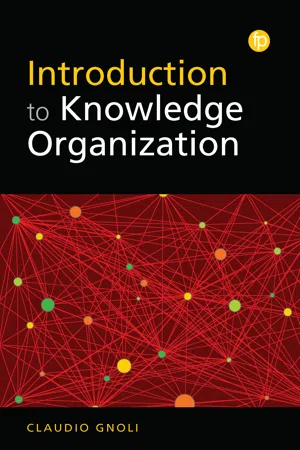
- 104 pages
- English
- PDF
- Available on iOS & Android
Introduction to Knowledge Organization
About this book
This book provides a complete introduction to the rapidly expanding field of Knowledge organization (KO), presenting historical precedents and theoretical foundations in a discursive, intelligible form, covering the philosophical, linguistic and technical aspects. In the contemporary context of global information exchange through linked data, Knowledge organization systems (KOS) need to be represented in standard inter-operable formats. Different formats for KOS representation including MARC, Dublin Core, SKOS and OWL are introduced as well as the application of Knowledge organization to a variety of activities and contexts: education, encyclopedic knowledge, the Internet, libraries, archives, museums, galleries and other institutions collecting and providing access to recorded knowledge.
Key coverage includes:
• ontology and epistemology in KO
• KO structures: lists, hierarchies, facets...
• KO types: tagging, taxonomies, thesauri, classifications...
• conceptual analysis of documents
• applications in the digital age.
Covering theoretical and practical aspects of KO and using real-life examples to illustrate its application, this book will be a valuable resource for students, researchers and practitioners of Knowledge organization, information organization, cataloguing and classification.
Tools to learn more effectively

Saving Books

Keyword Search

Annotating Text

Listen to it instead
Information
Table of contents
- Endorsement
- Title page
- Contents
- CHAPTER 1 Focusing the field
- CHAPTER 2 Theories of knowledge organization
- CHAPTER 3 Structural principles in knowledge organization
- CHAPTER 4 Knowledge organization systems (KOSs)
- CHAPTER 5 Representation of knowledge organization structures
- CHAPTER 6 Applying knowledge organization
- References
- Index
Frequently asked questions
- Essential is ideal for learners and professionals who enjoy exploring a wide range of subjects. Access the Essential Library with 800,000+ trusted titles and best-sellers across business, personal growth, and the humanities. Includes unlimited reading time and Standard Read Aloud voice.
- Complete: Perfect for advanced learners and researchers needing full, unrestricted access. Unlock 1.4M+ books across hundreds of subjects, including academic and specialized titles. The Complete Plan also includes advanced features like Premium Read Aloud and Research Assistant.
Please note we cannot support devices running on iOS 13 and Android 7 or earlier. Learn more about using the app